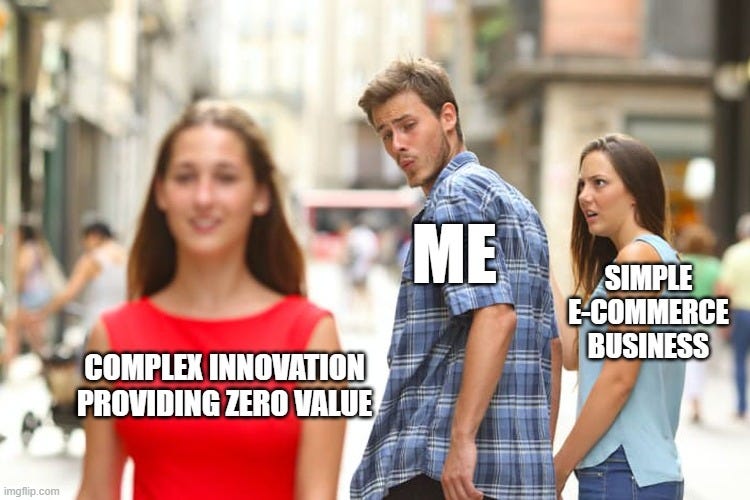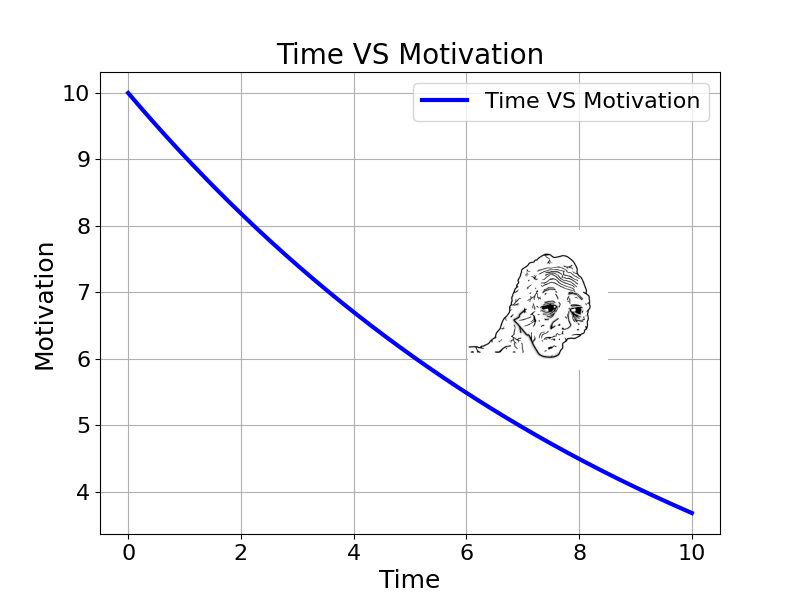Why I Struggle to Finish Projects: Unraveling the Coolness Trap
Exploring the Mathematical Relationship Between Coolness, Complexity, Time, and Motivation
The realization
Funny thing is, this post was supposed to be a totally different one where I looked at how we can create a formula for maximizing impact per hour when creating an application or writing a piece of content. The subject truly fascinated me, but I ended up not completing it since it got too complex and the effort and time to complete it were overwhelming.
This got me thinking: how many times has this happened before? How many times have I started coding on some project just to give up halfway through when motivation ran out? The answer I came up with was 90% of the time. That is a huge mountain of unfinished projects and shattered dreams. These projects range in complexity and size, from a simple tweet to a complicated SaaS product leveraging different machine learning techniques to identify patterns in large quantities of data.
The solution
If I spent more time analyzing why I finish projects at a low rate instead of constantly searching for the next cool project, I would likely increase my chances of success. However, here's the kicker: analyzing my completion rate isn't as exciting and cool as starting a new project.
That conclusion made me understand that the main driver or motivator for me in any project is how cool something is on a scale from 1 to 10. If it isn't cool, I won't do it. So maybe the issue is somehow connected to this coolness-scale. Could it somehow be the reason why my success rate is so low? Let's take a look.
The coolness trap
First of all, what is coolness for me? When I think about cool stuff, I think about flying cars, AI, great design, and innovations. It seems that coolness for me is a function of complexity (f(complexity)), meaning that the more complex something is, the cooler I think it is. I would model it as a simple linear relation like this:
But if complexity is the driver of my motivation, I am pretty sure that the motivation vs. complexity curve looks something like this:
This shows that there is an optimal amount of complexity to spark my motivation. If I get tasked with creating a flying car, I would think it's a super cool idea but also an impossible one, resulting in low motivation. But does this solely explain why I can't finish projects? Not quite. Let's look at how complexity affects the time it takes to finish something.
Time is an exponential function of complexity, which means that time grows at an accelerating rate as complexity increases. But how does time affect my motivation in the long run?
Here, it's the other way around: my motivation decreases at an accelerating rate as time increases. So these are the parameters we have discovered so far:
Coolness: 1 to 10 (Main driver)
Complexity: Increases with coolness
Time: Increases with complexity
Motivation: Starts high on coolness, decreases with time
What now?
Well, we went down the rabbit hole trying to model the relationship between different parameters that affect the rate at which I finish projects. I get motivated by complexity because I think complex stuff is cool. Complex stuff has both a positive and negative effect on motivation, where too high complexity leads to a higher risk of depleting my motivation, and low complexity does not give me the initial motivation at all. This, ladies and gentlemen, is a typical case of a Catch-22 situation: there is no scenario where I win.
Potential solution
So, we have to change the relationship between coolness and complexity, where coolness is no longer a function of complexity. Instead of f(complexity), we need a new input! But that is easier said than done. What motivates us and what we think is cool is deeply rooted in our personality. I can't just go from flying cars to sticks and stones—I simply won't! Fortunately for me, complexity is very nuanced, and there are multiple types of complexity.
Technical Complexity vs. Intellectual Complexity
Technical Complexity: Refers to the intricacy of the technical aspects of a system, process, or task. It deals with the technical components and their interactions, dependencies, and the difficulty of managing these components. This is the type of complexity I face when developing my applications, or at least the part of complexity that gives me the most frustration—the so-called "WHY THE HELL WON'T THIS WORK" type of complexity.
Intellectual Complexity: Refers to the cognitive demands and the level of abstract thinking, problem-solving, and understanding required to grasp and manage a concept, problem, or task. It deals with the intellectual effort and cognitive processes involved.
So, developing a blog platform inherently involves mostly technical complexity, while writing a blog post about the speed of light involves mostly intellectual complexity.
The Old Switcheroo
It turns out that I am equally motivated by both types, but intellectual complexity does not seem to deplete my motivation as fast. Most of the time, the time vs. intellectual complexity curve does not seem to accelerate as quickly. So, instead of coolness = f(complexity), we need to redefine it as coolness = f(intellectual complexity), which works a lot better. So when I evaluate what project I should choose, I will use technical complexity as a punishing metric and intellectual complexity as an engaging metric.






